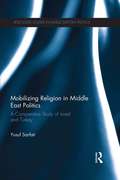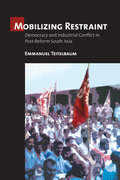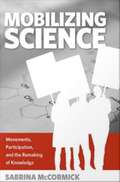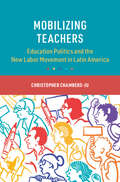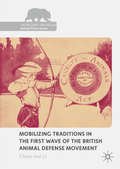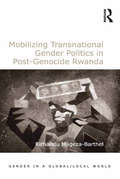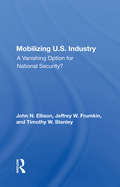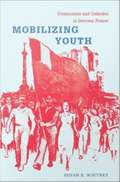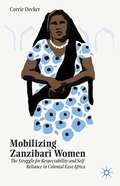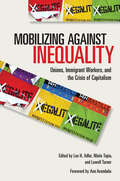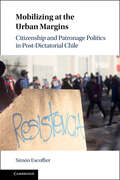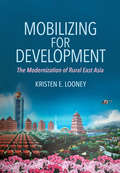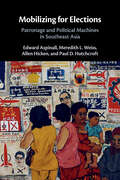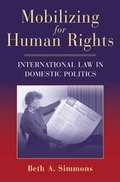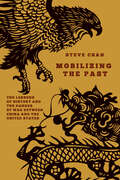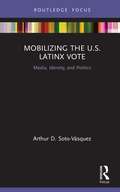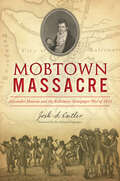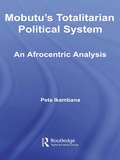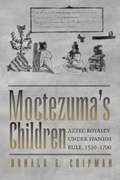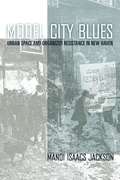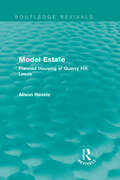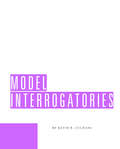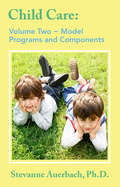- Table View
- List View
Mobilizing Religion in Middle East Politics: A Comparative Study of Israel and Turkey (Routledge Studies in Middle Eastern Politics)
by Yusuf SarfatiContrary to the expectations of the secularization theorists, religious political movements rose to prominence in numerous countries across the globe in the past three decades. By examining the conditions that underlie the electoral fortunes of religious actors in democratic regimes, this book contributes to our understanding of this worldwide religious resurgence. Employing a social movement theory framework, Mobilizing Religion in Middle East Politics explores the macro and micro dynamics of successful political mobilization by Sephardic Torah Guardians (Shas) in Israel and the National Outlook Movement in Turkey in the recent decades. In a comparative framework, the book demonstrates how ripe political opportunities, appropriate frames and dense social networks contribute to building popular support in Israel and Turkey. Yusuf Sarfati also assesses the effects of the increasing political power of religious actors on democratic governance and illustrates similarities and differences between two countries. Drawing on empirical data from a range of interviews conducted in both Israel and Turkey, this book provides a comparative study of religious politics in two countries that are often thought of as ‘exceptional cases,’ and are rarely compared. As such, this book is a welcome contribution for those studying Middle East politics, comparative politics, religious politics, democratization and social movements.
Mobilizing Restraint: Democracy and Industrial Conflict in Post-Reform South Asia
by Emmanuel TeitelbaumIn Mobilizing Restraint, Emmanuel Teitelbaum argues that, contrary to conventional wisdom, democracies are better at managing industrial conflict than authoritarian regimes. This is because democracies have two unique tools at their disposal for managing worker protest: mutually beneficial union-party ties and worker rights. By contrast, authoritarian governments have tended to repress unions and to sever mutually beneficial ties to organized labor. Many of the countries that fall between these two extremes—from those that have only the trappings of democracy to those that have imperfectly implemented democratic reforms—exert control over labor in the absence of overt repression but without the robust organizational and institutional capacity enjoyed by full-fledged democracies. Based on the recent history of industrial conflict and industrial peace in South Asia, Teitelbaum argues that the political exclusion and repression of organized labor commonly witnessed in authoritarian and hybrid regimes has extremely deleterious effects on labor relations and ultimately economic growth. To test his arguments, Teitelbaum draws on an array of data, including his original qualitative interviews and survey evidence from Sri Lanka and three Indian states—Kerala, Maharashtra, and West Bengal. He also analyzes panel data from fifteen Indian states to evaluate the relationship between political competition and worker protest and to study the effects of protective labor legislation on economic performance. In Teitelbaum’s view, countries must undergo further political liberalization before they are able to replicate the success of the sophisticated types of growth-enhancing management of industrial protest seen throughout many parts of South Asia.
Mobilizing Science: Movements, Participation, and the Remaking of Knowledge
by Sabrina MccormickMobilizing Science theoretically and empirically explores the rise of a new kind of social movement--one that attempts to empower citizens through the use of expert scientific research. Sabrina McCormick advances theories of social movements, development, and science and technology studies by examining how these fields intersect in cases around the globe. McCormick grounds her argument in two very different case studies: the anti-dam movement in Brazil and the environmental breast cancer prevention movement in the U. S. These, and many other cases, show that the scientization of society, where expert knowledge is inculcated in multiple institutions and lay people are marginalized, gives rise to these new types of movements. While activists who consequently engage in science often instigate new methods that result in new findings and scientific tools, these movements still often fail due to superficial participatory institutions and tightly knit corporate/government relationships.
Mobilizing Teachers: Education Politics and the New Labor Movement in Latin America (Cambridge Studies in the Comparative Politics of Education)
by Christopher Chambers-JuThe political participation of public school teachers in new democracies has generated heated debates. In some countries, teacher strikes shutter schools for months each year; in others, teachers' unions have become powerful political machines and have even formed new political parties. To explain these contrasts, Mobilizing Teachers delves into changes in education politics and the labor movement. Christopher Chambers-Ju argues that union organizations fundamentally shape teacher mobilization, with far-reaching implications for politics and policy. With detailed case studies of Argentina, Colombia, and Mexico, this book is the first comparative analysis of teacher politics in Latin America. Drawing on extensive field research and multiple sources of data, it enriches theoretical perspectives in political science and sociology on the interplay between protests, electoral mobilization, and party alliances. This title is part of the Flip it Open Programme and may also be available Open Access. Check our website Cambridge Core for details.
Mobilizing Traditions in the First Wave of the British Animal Defense Movement (The Palgrave Macmillan Animal Ethics Series)
by Chien-hui LiThis book explores the British animal defense movement’s mobilization of the cultural and intellectual traditions of its time- from Christianity and literature, to natural history, evolutionism and political radicalism- in its struggle for the cause of animals in the nineteenth and early twentieth centuries. Each chapter examines the process whereby the animal protection movement interpreted and drew upon varied intellectual, moral and cultural resources in order to achieve its manifold objectives, participate in the ongoing re-creation of the current traditions of thought, and re-shape human-animal relations in wider society. Placing at its center of analysis the movement’s mediating power in relation to its surrounding traditions, Li’s original perspective uncovers the oft-ignored cultural work of the movement whilst restoring its agency in explaining social change. Looking forward, it points at the same time to the potential of all traditions, through ongoing mobilization, to effect change in the human-animal relations of the future.
Mobilizing Transnational Gender Politics in Post-Genocide Rwanda (Gender in a Global/Local World)
by Rirhandu Mageza-BarthelMageza-Barthel provides a context sensitive analysis of how Rwanda's women's movement used the United Nations (UN) gender norms in its efforts to insert gender-specific demands in the post-genocide period. The overall goal of these women - and their supporters - has been to further gender equality and equity in Rwanda. This study details which political processes could be engendered. It further illustrates why certain gender norms were adopted and adapted, whereas others were not. The study addresses issues of global governance in gender politics through such international frameworks as CEDAW, the Beijing Declaration and Platform for Action, as well as Resolution 1325. These instruments have been brought forth by a transnational women’s movement to benefit women and women’s rights across the globe. It shows how these gender norms were introduced, adapted and contested locally at a crucial time of the transformation process underway. Concerned with the interplay of domestic and international politics, it also alludes to the unique circumstances in Rwanda that have led to unprecedented levels of women’s political representation. Which tools have been the most significant in women’s mobilisation and how these relate to precedents set within international relations is of interest to a wide community of scholars and policy-makers alike.
Mobilizing U.S. Industry: A Vanishing Option For National Security?
by John N Ellison Jeffrey W. FrumkinOriginally published in 1988, this volume outlines the need for a series of organisational reforms, new studies and committees to focus attention on mobilization issues and to provide an administrative framework for enhancing the mobilization base. The authors point out that mobilization is becoming a more viable US national security option. Case studies are used around raw materials of petroleum, ferroalloys, machine tools and semi-conductors which highlight common problems of diminishing domestic market share and growing reliance on foreign sector capacity, declining profits, research and development expense, a decline of skilled labour and economic decline in subsector industries
Mobilizing Youth: Communists and Catholics in Interwar France
by Susan B. WhitneyIn Mobilizing Youth, Susan B. Whitney examines how youth moved to the forefront of French politics in the two decades following the First World War. In those years Communists and Catholics forged the most important youth movements in France. Focusing on the competing efforts of the two groups to mobilize the young and harness generational aspirations, Whitney traces the formative years of the Young Communists and the Young Christian Workers, including their female branches. She analyzes the ideologies of the movements, their major campaigns, their styles of political and religious engagement, and their approaches to male and female activism. As Whitney demonstrates, the recasting of gender roles lay at the heart of Catholic efforts and became crucial to Communist strategies in the mid-1930s. Moving back and forth between the constantly shifting tactics devised to mobilize young people and the circumstances of their lives, Whitney gives special consideration to the context in which the youth movements operated and in which young people made choices. She traces the impact of the First World War on the young and on the formulation of generation-based political and religious identities, the role of work and leisure in young people's lives and political mobilization, the impact of the Depression, the importance of Soviet ideas and intervention in French Communist youth politics, and the state's attention to youth after the victory of France's Popular Front government in 1936. Mobilizing Youth concludes by inserting the era's youth activists and movements into the complicated events of the Second World War.
Mobilizing Zanzibari Women
by Corrie DeckerThe experiences of African women in the era before independence remain a woefully understudied facet of African history. This innovative and carefully argued study thus adds tremendously to our understanding of colonial history by focusing on women's education, professionalization, and political mobilization in the East African islands of Zanzibar.
Mobilizing against Inequality: Unions, Immigrant Workers, and the Crisis of Capitalism
by Lee H. Adler Maite Tapia Ana Avendaño Lowell TurnerAmong the many challenges that global liberalization has posed for trade unions, the growth of precarious immigrant workforces lacking any collective representation stands out as both a major threat to solidarity and an organizing opportunity. Believing that collective action is critical in the struggle to lift the low wages and working conditions of immigrant workers, the contributors to Mobilizing against Inequality set out to study union strategies toward immigrant workers in four countries: Germany, France, the United Kingdom, and United States. Their research revealed both formidable challenges and inspiring examples of immigrant mobilization that often took shape as innovative social countermovements.Using case studies from a carwash organizing campaign in the United States, a sans papiers movement in France, Justice for Cleaners in the United Kingdom, andintegration approaches by the Metalworkers Union in Germany, among others, the authors look at the strategies of unions toward immigrants from a comparative perspective. Although organizers face a different set of obstacles in each country, this book points to common strategies that offer promise for a more dynamic model of unionism is the global North. The editors have also created a companion website for the book, which features literature reviews, full case studies, updates, and links to related publications. Visit it at www.mobilizing-against-inequality.info.Contributors: Lee H. Adler, Cornell University; Gabriella Alberti, Leeds University; Daniel B. Cornfield, Vanderbilt University; Michael Fichter, Global Labour University, Berlin; Janice Fine, Rutgers, The State University of New Jersey; Jane Holgate, Leeds University; Denisse Roca-Servat, Pontifical Bolivarian University, Colombia; Maite Tapia, Michigan State University; Lowell Turner, Cornell University.
Mobilizing at the Urban Margins: Citizenship and Patronage Politics in Post-Dictatorial Chile
by Simón EscoffierIn October 2019, unprecedented mobilizations in Chile took the world by surprise. An outburst of protests plunged a stable democracy into the deepest social and political crisis since its dictatorship in the 1980s. Although the protests involved a myriad of organizations, the organizational capabilities provided by underprivileged urban dwellers proved essential in sustaining collective action in an increasingly repressive environment. Based on a comparative ethnography and over six years of fieldwork, Mobilizing at the Urban Margins uses the case of Chile to study how social mobilization endures in marginalized urban contexts, allowing activists to engage in large-scale democratizing processes. The book investigates why and how some urban communities succumb to exclusion, while others react by resurrecting collective action to challenge unequal regimes of citizenship. Rich and insightful, the book develops the novel analytical framework of 'mobilizational citizenship' to explain this self-produced form of political incorporation in the urban margins.
Mobilizing for Development: The Modernization of Rural East Asia
by Kristen E. LooneyMobilizing for Development tackles the question of how countries achieve rural development and offers a new way of thinking about East Asia's political economy that challenges the developmental state paradigm. Through a comparison of Taiwan (1950s–1970s), South Korea (1950s–1970s), and China (1980s–2000s), Kristen E. Looney shows that different types of development outcomes—improvements in agricultural production, rural living standards, and the village environment—were realized to different degrees, at different times, and in different ways. She argues that rural modernization campaigns, defined as policies demanding high levels of mobilization to effect dramatic change, played a central role in the region and that divergent development outcomes can be attributed to the interplay between campaigns and institutions. The analysis departs from common portrayals of the developmental state as wholly technocratic and demonstrates that rural development was not just a byproduct of industrialization. Looney's research is based on several years of fieldwork in Asia and makes a unique contribution by systematically comparing China's development experience with other countries. Relevant to political science, economic history, rural sociology, and Asian Studies, the book enriches our understanding of state-led development and agrarian change.
Mobilizing for Elections: Patronage and Political Machines in Southeast Asia
by Edward Aspinall Allen Hicken Meredith L. Weiss Paul D. HutchcroftPoliticians in Southeast Asia, as in many other regions, win elections by distributing cash, goods, jobs, projects, and other benefits to supporters, but the ways in which they do this vary tremendously, both across and within countries. Mobilizing for Elections presents a new framework for analyzing variation in patronage democracies, focusing on distinct forms of patronage and different networks through which it is distributed. The book draws on an extensive, multi-country, multi-year research effort involving interactions with hundreds of politicians and vote brokers, as well as surveys of voters and political campaigners across the region. Chapters explore how local machines in the Philippines, ad hoc election teams in Indonesia, and political parties in Malaysia pursue distinctive clusters of strategies of patronage distribution – what the authors term electoral mobilization regimes. In doing so, the book shows how and why patronage politics varies, and how it works on the ground.
Mobilizing for Human Rights: International Law in Domestic Politics
by Beth A. SimmonsThis volume argues that international human rights law has made a positive contribution to the realization of human rights in much of the world. Although governments sometimes ratify human rights treaties, gambling that they will experience little pressure to comply with them, this is not typically the case. Focusing on rights stakeholders rather than the United Nations or state pressure, Beth Simmons demonstrates through a combination of statistical analyses and case studies that the ratification of treaties leads to better rights practices on average. By several measures, civil and political rights, women's rights, a right not to be tortured in government detention, and children's rights improve, especially in the very large heterogeneous set of countries that are neither stable autocracies nor stable democracies. Simmons argues that international human rights law should get more practical and rhetorical support from the international community as a supplement to broader efforts to address conflict, development, and democratization.
Mobilizing the Past: The Lessons of History and the Danger of War between China and the United States
by Steve ChanHistorical analogies are often utilized to frame and formulate foreign policies, illuminate issues of war and peace, and mobilize support for particular political programs. The historical record, however, can be distorted in a variety of ways, leading to overly simplistic, misleading conclusions that impair sound policy and scholarship. This danger is most imminent and palpable when there exists premature academic consensus, pressure to conform to political orthodoxy, intellectual complacency, and cognitive resistance to alternate interpretations of historical episodes. We must be especially vigilant to guard against these pitfalls when deliberating one of the most high-stakes topics in global politics: the alarming potential for military conflict between the United States and China. Past precedents and parallels regularly inform analyses of China's relations with the US. By highlighting serious errors of commission or omission in popular narratives and scholarly studies concerning international relations in general and Sino-American relations in particular, Steve Chan challenges commonly accepted "lessons of history" and cautions against the misuse and misunderstanding of the past in examining China's rise and its implications for international peace and stability. This far-reaching book presents alternative, overlooked historical accounts that are highly pertinent to Sino-American relations today, making it essential for researchers and students of international affairs.
Mobilizing the U.S. Latinx Vote: Media, Identity, and Politics (Routledge Focus on Digital Media and Culture)
by Arthur D. Soto-VásquezThis book examines the politics involved in the mobilization of the Latinx vote in America. Delving into the questions of race and identity formation in conjunction with the role of communication media, the author discusses the implications for Latinx voters and their place in the American political and racial system. Utilizing an in-depth study of the mobilizing efforts of national Latinx groups, along with a rigorous analysis of online media, news media, and electoral results, this book discusses: How the old notions of white and black America clash with the growing focus on Latinos How political organizers develop and use messages of racial solidarity to motivate people, what technologies are at their disposal, and what their use means How the study of new media is vital to exploring race in the 21st century, and why communication cannot ignore the racial legacies of the 20th century Theoretically located in between the fields of communication and racial/ethnic studies, this book will be of great relevance to scholars and students working in the field of communication studies, political communication, Latinx studies, and sociology.
Mobtown Massacre: Alexander Hanson and the Baltimore Newspaper War of 1812 (True Crime)
by Josh S. CutlerWinner of the 2020 Baltimore History Prize, this is a gripping account of how a Federalist editor risked his life to defend his anti-war views. With a bitterly divided nation plunged into the War of 1812, Alexander Hanson penned an anti-war editorial that provoked a violent standoff that crippled the city of Baltimore and left Hanson beaten within an inch of his life. This little-known episode in American history—complete with a midnight jailbreak, bloodthirsty mobs and unspeakable acts of torture—helped shape the course of war, the Federalist Party and the nation&’s very notion of the freedom of the press. Josh Cutler&’s history of the Mobtown Massacre offers a lesson in liberty that reverberates today. &“A compelling story that&’s as timely today as it was two centuries ago.&” —Congressman William R. Keating &“A remarkably vivid, engaging and very readable account of a brief but major event in Baltimore history . . . which reflected the sharp political divisiveness of the time at the start of the War of 1812, and had important implications for freedom of the press and the war itself.&”—Charles Markell, board member, Baltimore City Historical Society &“A timely and scholarly examination of one man&’s struggle for freedom of the press.&”—Fred Dorsey, Howard County, MD historian &“Cutler&’s book tells not only of politics of that era and the controversy of a war that ultimately led to the burning of the White House and the writing of &‘The Star-Spangled Banner&’ by Francis Scott Key, but also how it challenged America&’s devotion to a free press.&” —The Baltimore Sun
Mobutu's Totalitarian Political System: An Afrocentric Analysis (African Studies)
by Jean-Louis Peta IkambanaMobutu's political system, inaugurated in 1965 and lasting more than three decades, met all the characteristics of totalitarianism. This study shows that the failures and misdeeds of Mobutu's system were clear evidence that it lacked an African-centred vision and did not put the interests of the African people of Congo (formerly Zaire) at the centre of this political project. In this study Mobutu's political actions in the 1990s - mostly as they related to the National Sovereign Conference - are critically analyzed and found to be a deliberate attempt to obstruct the momentum of democracy for the African people of Congo. From an Afro centric standpoint, this obstruction is evidence of Mobutu's attempt to impede the search for harmony and peace by the Zairian people, and to reject the African-centred truth that without Ma'at (harmony) there is no understanding and no possible restoration of balance. Mobutu's Totalitarian Political System will be of interest to students and scholars of ethnic studies, political science and international relations.
Moctezuma's Children: Aztec Royalty under Spanish Rule, 1520-1700
by Donald E. ChipmanThough the Aztec Empire fell to Spain in 1521, three principal heirs of the last emperor, Moctezuma II, survived the conquest and were later acknowledged by the Spanish victors as reyes naturales (natural kings or monarchs) who possessed certain inalienable rights as Indian royalty. For their part, the descendants of Moctezuma II used Spanish law and customs to maintain and enhance their status throughout the colonial period, achieving titles of knighthood and nobility in Mexico and Spain. So respected were they that a Moctezuma descendant by marriage became Viceroy of New Spain (colonial Mexico's highest governmental office) in 1696.
Model City Blues: Urban Space and Organized Resistance in New Haven
by Mandi Isaacs JacksonModel City Blues tells the story of how regular people, facing a changing city landscape, fought for their own model of the "ideal city" by creating grassroots plans for urban renewal. Filled with vivid descriptions of significant moments in a protracted struggle, it offers a street-level account of organized resistance to institutional plans to transform New Haven, Connecticut in the 1960s. Anchored in the physical spaces and political struggles of the city, it brings back to center stage the individuals and groups who demanded that their voices be heard. By reexamining the converging class- and race-based movements of 1960s New Haven, Mandi Jackson helps to explain the city's present-day economic and political struggles. More broadly, by closely analyzing particular sites of resistance in New Haven, Model City Blues employs multiple academic disciplines to redefine and reimagine the roles of everyday city spaces in building social movements and creating urban landscapes.
Model Estate: Planned Housing at Quarry Hill, Leeds (Routledge Revivals)
by Alison RavetzQuarry Hill Flats, once both the pride and shame of its city of Leeds, was an iconic Modernist symbol of the 1930s. It marked the first use of a prefabricated building system for a large-scale council estate, replacing a notorious slum. But it lasted barely a generation – its complete demolition was announced as Alison Ravetz was finishing this study. First published in 1974, this book is unique in its use of all estate records from conception to destruction, as well as in its comprehensive approach, including aspects usually missing in council housing studies – notably the intimate experience of residents, and a fraught, long-drawn-out building period. Ravetz argues that the Flats’ ‘failure’ was due not to social breakdown, as repeatedly alleged, but rather to a rigidity of design and management unable to accommodate gradual, incremental change. This has continuing implications for the operation of bureaucratically designed and controlled ‘social housing’ today.
Model Immigrants and Undesirable Aliens: The Cost of Immigration Reform in the 1990s
by Christina GerkenDuring 1995 and 1996, President Bill Clinton signed into law three bills that altered the rights and responsibilities of immigrants: the Antiterrorism and Effective Death Penalty Act, the Personal Responsibility Act, and the Illegal Immigration Reform and Immigrant Responsibility Act. Model Immigrants and Undesirable Aliens examines the changing debates around immigration that preceded and followed the passage of landmark legislation by the U.S. Congress in the mid-1990s, arguing that it represented a new, neoliberal way of thinking and talking about immigration. Christina Gerken explores the content and the social implications of the deliberations that surrounded the development and passage of immigration reform, analyzing a wide array of writings from congressional debates and committee reports to articles and human-interest stories in mainstream newspapers. The process, she shows, disguised its underlying racism by creating discursive strategies that shaped and upheld an image of &“desirable&” immigrants—those who could demonstrate &“personal responsibility&” and an ability to contribute to the U.S. economy. Gerken finds that politicians linked immigration to complex issues: poverty, welfare reform, so-called family values, measures designed to combat terrorism, and the spiraling costs of social welfare programs. Although immigrants were often at the center of congressional debates, politicians constructed an elaborate, abstract terminology that appeared to be unrelated to race or gender. Instead, politicians promoted neoliberal policies as the avenue to a postracist, postsexist world of opportunity for every rational consumer with an entrepreneurial spirit. Still, Gerken concludes that the passage of pathbreaking legislation was characterized by a useful tension between neoliberal assumptions and hidden anxieties about race, class, gender, and sexuality.
Model Interrogatories
by Kevin CulhaneModel Interrogatories Writing custom interrogatories can be one of the most critical aspects of your discovery plan. Asking the right questions in the proper format is the key to getting complete responses and avoiding nagging objections. Model Interrogatories is a comprehensive set of pre-drafted questions covering a variety of substantive areas that will help you quickly zero in on the most critical issues in every case. Here are 7 reasons to try the book: 1. Saves time--Customizing pre-drafted questions can save you hours. 2. Covers 26 different types of cases--These interrogatories tackle the tough legal issues that arise in a variety of cases. 3. Better answers--Each stand-alone interrogatory is direct, clear, and goes straight to the heart of the information critical to your case. You'll elicit more complete answers, avoid objections, and reduce the number of non-responsive answers. 4. More efficient discovery--You'll acquire more information with less effort and expense by using these interrogatories to guide your format and substantive coverage. 5. Digital access--Speed up production by inserting selected questions directly into your discovery. 6. Better utilize your staff--The book is so easy to use, your staff can prepare comprehensive discovery with relatively minor supervision. 7. Improve your standard interrogatories--Use the clearly phrased questions and definitions to supplement interrogatory sets you use repeatedly.
Model Programs and Their Components
by James A Rivaldo Ph.D. Stevanne AuerbachModel Programs and Components focuses on the planning and implementation of model programs and presents necessary steps to achieve a comprehensive and practical service to the community including health, food, social, and psychological services and documents local experiences in Appalachia, California, Colorado and Oregon. Foreword by Congressman John Brademas, former President of New York University. Contributors include James A. Levine, Helen L. Gordon, Jean H. Berman, Kathleen B. Latham, Kay Martin, Mary Millman, Mary W.Vlack, Ramon D. Blatt, Paul T. Barnes, Dr. Ann De Huff Peters, Dr. Susan S Aronson, Marilyn Chow, Dorothy N. Shack, David Brown, Keith R. Alward, Linda Regele-Sinclair, Christoph M, Heinicke, Dr. David Friedman, Dr. Elizabeth Prescott, Conchita Puncel, and June Solnit Sale.
